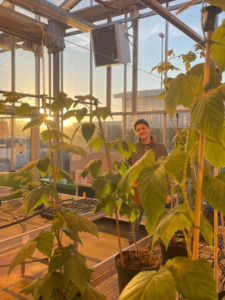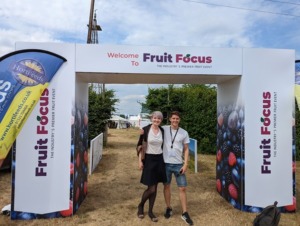A year at Cranfield
09/05/2023

The start of April 2023 marked a year since I began my PhD in plant molecular biology at Cranfield. My project focuses on bringing academic research into a commercial setting, which, as an applied scientist, was highly appealing to me. Specifically, I’m developing a gene editing method in raspberries which would dramatically accelerate breeding, and hopefully make growing the crop more sustainable through improving disease resistance, reducing waste and requiring fewer chemical inputs. Nobody has ever gene edited a raspberry before (or at least hasn’t published it), which is quite surprising because nearly 900,000 tonnes of them are sold every year, with a combined import/export value of $6.6 billion dollars per annum.
 Figure 1: Raspberry plants (and me) enjoying the late evening sunshine in the Cranfield glasshouse.
Figure 1: Raspberry plants (and me) enjoying the late evening sunshine in the Cranfield glasshouse.
You may ask: ‘why would anyone with a sane mind spend four years of their life researching a relatively minor fruit crop?’, which remains a valid question, although for me the crop species is secondary to developing expertise in one of the most consequential developments in molecular biology this century – gene editing with CRISPR-Cas9. This technology allows scientists like me to make tiny, highly precise changes in practically any species’ DNA, which is incredibly useful for many, many, many things. A simple theoretical example would be an edit that increases the production of a structural protein found in raspberry fruit walls, meaning the fruit doesn’t burst as easily, meaning fungi like Botrytis cinerea (grey mould – like you find on all kinds of fruit) can’t take hold and ruin your summer picnics. This would save millions of pounds for growers, bring down prices for consumers and reduce the carbon footprint of the industry.
Anyhow, I knew I wanted to work on gene editing, and I’m interested in making agriculture more sustainable (agriculture is responsible for 21% of global greenhouse gas emissions, more than all planes, trains and cars combined), so the two pair together well in the plant sciences. When I searched ‘plant gene editing PhDs’, one at Cranfield popped up and it was a perfect fit. I quit my job in the Civil Service and headed to Bedfordshire.
I threw myself into my PhD at Cranfield from the moment it started as it finally felt like I had a trajectory again, which was a great feeling. Cranfield was a very different experience from previous Universities I’d studied at, with a much more remote campus and no undergraduates getting stuck underfoot. There are many dualities, such as a lack of undergrads meaning you get a lot more focus from your supervisors, but the campus itself is much quieter, without a raucous student union. Traffic cones, for the most part, remain unharmed.
It was a good balance for me, as it was still a lot more sociable than a workplace office, and I made friends quickly. PhD life requires many hours spent working alone, so you need people to chat to at lunch. I was also lucky, as I got positive results relatively soon after joining (most people will wait at least a year before they’re up and running), which in part is due to the nature of my project requiring short experiments repeated many times, and part due to the fact that barely anybody conducts molecular research on raspberries. I also worked quite hard. There are few better feelings in the world than getting positive results that are entirely down to your own hard work.

Figure 2: Single raspberry cells marked with a fluorescent viability stain. Each cell can be gene edited in this state and go on (theoretically) to grow into a new, enhanced raspberry plant.
I’ve also worked closely with our industrial sponsor, which is an invaluable experience that Cranfield really does facilitate more than most universities, by offering projects with significant commercial applications.
Getting their perspective on my research as I conduct it is imperative to ensure I stay focused on the issues I’m trying to solve, and most importantly, to ensure that my research does not just sit on a shelf (where many PhDs/research live and die) and is utilised in the real world. I’ve had the chance to go to three events/conferences so far, which are another fundamental part of doing a PhD – I cannot overstate the importance of networking – and they have all been useful experiences that help you put your own work into perspective and are an excellent chance to travel around a bit.

Figure 3: Fruit Focus 2022, an industry-focused event for fruit growers and academics.
I had absolutely no prior experience of the techniques I have used (just theoretical knowledge), and nobody else at Cranfield had used these techniques either, yet the amount of experience I have gained in my field in just one year is huge. I’m hopeful this will enable me, in another three years time, to take the next step in my career, be it remaining within academia or going commercial. I have no regrets about leaving my career and starting a PhD, it was the right decision for me. It’s scary to think I’ll be nearly 28 when I finish but I think deep down I always wanted to do a PhD, and so far, I’ve been enjoying studying at Cranfield.
Categories & Tags:
Leave a comment on this post:
You might also like…
From classroom to cockpit: What’s next after Cranfield
The Air Transport Management MSc isn’t just about learning theory — it’s about preparing for a career in the aviation industry. Adit shares his dream job, insights from classmates, and advice for prospective students. ...
Setting up a shared group folder in a reference manager
Many of our students are now busy working on their group projects. One easy way to share references amongst a group is to set up group folders in a reference manager like Mendeley or Zotero. ...
Company codes – CUSIP, SEDOL, ISIN…. What do they mean and how can you use them in our Library resources?
As you use our many finance resources, you will probably notice unique company identifiers which may be codes or symbols. It is worth spending some time getting to know what these are and which resources ...
Supporting careers in defence through specialist education
As a materials engineer by background, I have always been drawn to fields where technical expertise directly shapes real‑world outcomes. Few sectors exemplify this better than defence. Engineering careers in defence sit at the ...
What being a woman in STEM means to me
STEM is both a way of thinking and a practical toolkit. It sharpens reasoning and equips us to turn ideas into solutions with measurable impact. For me, STEM has never been only about acquiring ...
A woman’s experience in environmental science within defence
When I stepped into the gates of the Defence Academy it was the 30th September 2019. I did not know at the time that this would be the beginning of a long journey as ...








Comments are closed.